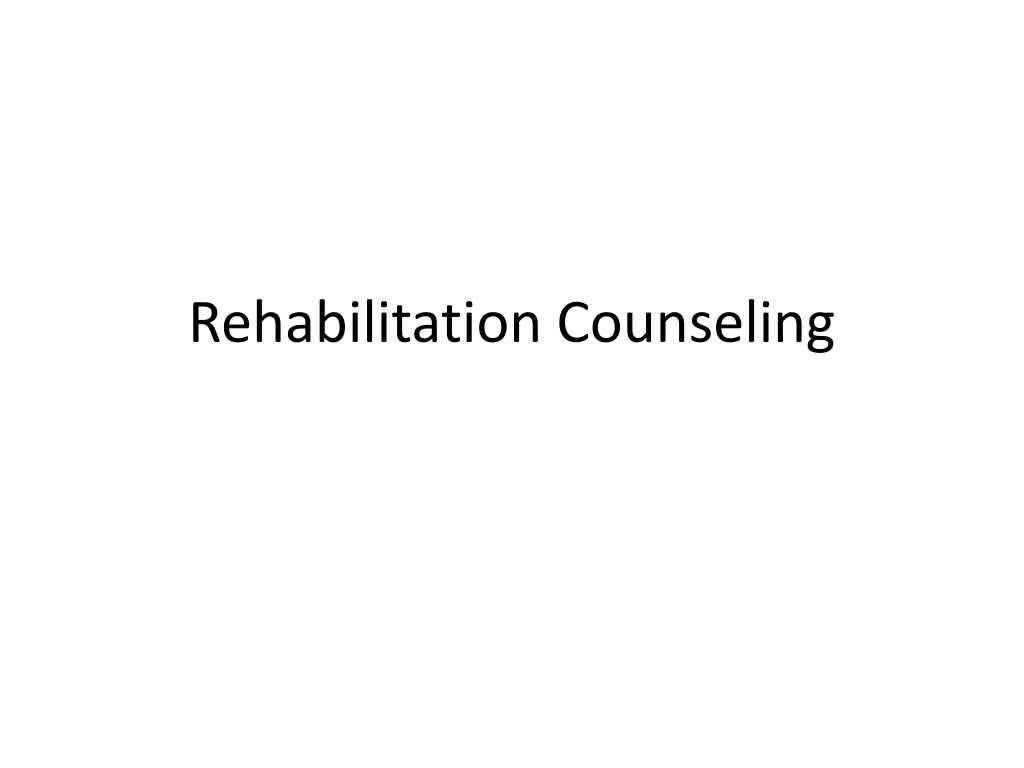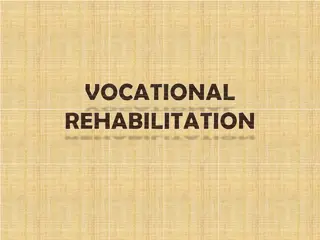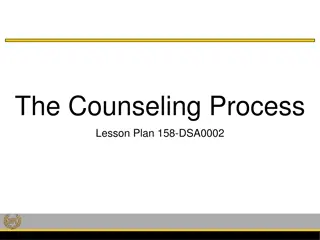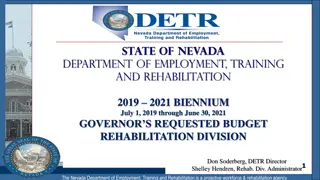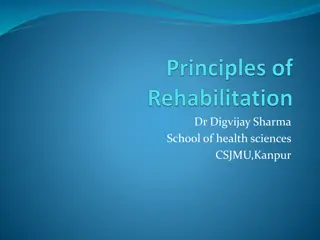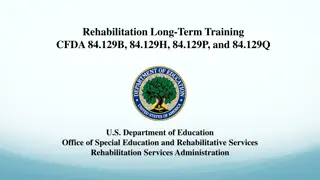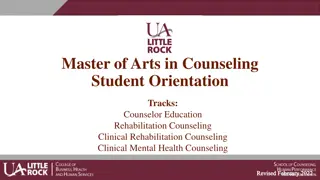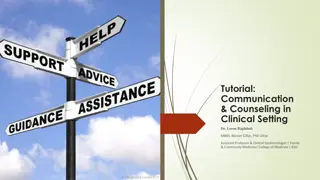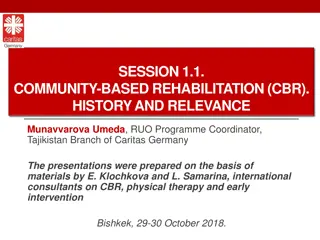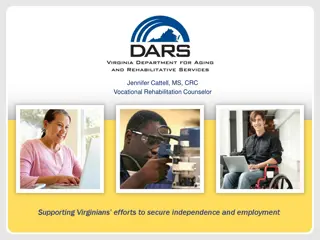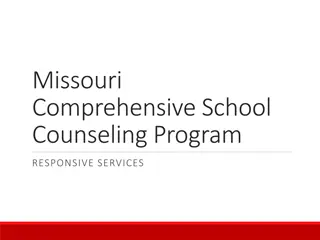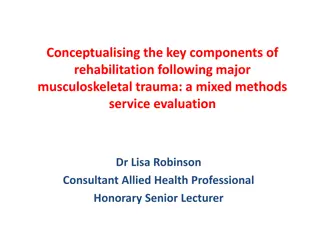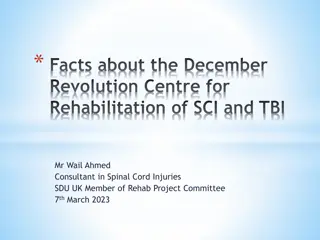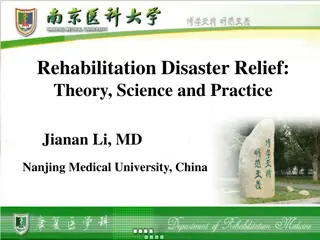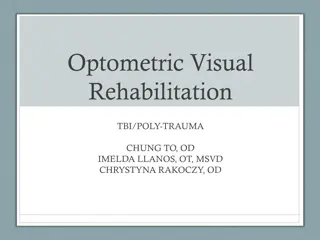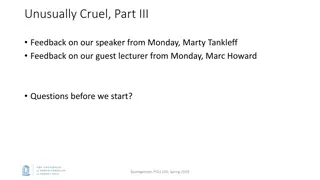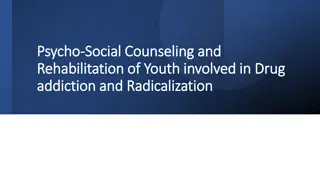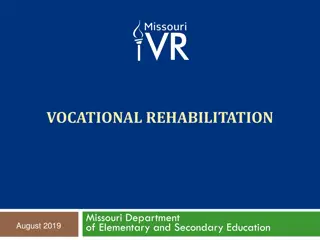Understanding Rehabilitation Counseling in the Professional Setting
Rehabilitation counseling is a specialized field within the rehabilitation professions that focuses on assisting individuals with disabilities to achieve personal, career, and independent-living goals. It involves a systematic process that aims to maximize employability, independence, integration, and participation of persons with disabilities in the workplace and community. The functions of rehabilitation counselors include assessment, treatment planning, and implementing strategies to support individuals in adapting to their environment and achieving full participation in society.
- Rehabilitation Counseling
- Disability Support
- Career Development
- Counseling Process
- Integrated Services
Download Presentation

Please find below an Image/Link to download the presentation.
The content on the website is provided AS IS for your information and personal use only. It may not be sold, licensed, or shared on other websites without obtaining consent from the author. Download presentation by click this link. If you encounter any issues during the download, it is possible that the publisher has removed the file from their server.
E N D
Presentation Transcript
Defining Rehabilitation Counseling Rehabilitation counseling is a specialty within the rehabilitation professions, with counseling at its core, and is differentiated from other related counseling fields. Rehabilitation counseling is a systematic process that assists persons with physical, mental, developmental, cognitive, and emotional disabilities to achieve their personal, career, and independent-living goals in the most integrated setting possible, through the application of the counseling process.
Defining Rehabilitation Counseling (cont.) Rehabilitation counseling is also defined as a profession that assists persons with disabilities in adapting to the environment, assists environments in accommodating the needs of the individual, and works toward full participation of persons with disabilities in all aspects of society, especially work.
Defining Rehabilitation Counseling (cont.) Rehabilitation within the context of the rehabilitation counseling process is therefore, a comprehensive sequence of services, mutually planned by the client and rehabilitation counselor, to maximize employability, independence, integration, and participation of persons with disabilities in the workplace and the community.
Functions/Tasks of Rehabilitation Counselors Assessment and appraisal: Selecting, administering, scoring, and interpreting instruments designed to assess an individual s attitudes, abilities, achievements, interests, personal characteristics, disabilities, and mental, emotional, or behavioral disorders, as well as the use of methods and techniques for understanding human behavior in relation to coping with, adapting to, or changing life situations.
Functions/Tasks of Rehabilitation Counselors (cont.) Treatment planning: Analyzing and providing diagnostic descriptions of mental, emotional, or behavioral conditions or disabilities; exploring possible solutions; and developing and implementing a treatment plan for mental, emotional, and psychosocial adjustment or development.
Functions/Tasks of Rehabilitation Counselors (cont.) Counseling treatment intervention: The application of cognitive, affective, behavioral, and systemic counseling strategies, that include family counseling, group counseling and sibling counseling.
Functions/Tasks of Rehabilitation Counselors (cont.) Referral: Evaluating and identifying the needs of a counselee to determine the advisability of referrals to other specialists, advising the counselee of such judgments, and communicating as requested or deemed appropriate to such referral sources.
Functions/Tasks of Rehabilitation Counselors (cont.) Case management and service coordination: A systematic process merging counseling and managerial concepts and skills, through the application of techniques derived from intuitive and researched methods, thereby advancing efficient and effective decision making for functional control of self, client, setting, and other relevant factors for anchoring a proactive practice.
Functions/Tasks of Rehabilitation Counselors (cont.) Program evaluation: The effort to determine what changes occur as a result of a planned program, by comparing actual changes (results) with desired changes (stated goals), and by identifying the degree to which the activity (planned program) is responsible for those changes.
Vocational Rehabilitation (Definition) Vocational Rehabilitation is a process of preparing people with disabilities for employment, placing them in jobs, and helping them cope effectively with their environment and to function as independently as possible. The major goal of vocational rehabilitation program is to assist persons who have disabilities become employed.
Services of Vocational Rehabilitation Some of the most common services in vocational rehabilitation include vocational assessment/evaluation, career guidance and counseling, training/education, and job placement.
Vocational Assessment/Evaluation People who suffer unexpected physical and mental disabilities often need to change their occupations. The expertise of vocational evaluators in vocational rehabilitation is important in making the change and transition. These professionals measure and evaluate skills in a variety of job areas. Vocational evaluators measure and assess the vocational interests, knowledge, and skills of individuals seeking to perform certain jobs.
Career Guidance/Counseling Career guidance/counseling is the process through which an individual is helped to choose a suitable occupation, make the necessary preparations for it (such as enrolling in a training program), enter into it, and develop in it.
Placement The practice of placement generally includes: contacting and developing ongoing relationships with employers; educating clients regarding job seeking, resume writing, interviewing, and job selecting; collaborating with clients and employers to make workplace accommodations; and following clients to ensure satisfaction with placements.
